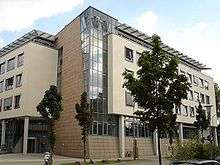Zentrum für Europäische Wirtschaftsforschung

The Centre for European Economic Research (ZEW) in Mannheim is an economic research institute and a member of the Gottfried Wilhelm Leibniz Scientific Community. Under the leadership of Prof. Achim Wambach, PhD, president of the Institute, and Thomas Kohl, director of business and administration, ZEW employs a staff of about 186.[1] ZEW is one of Europe’s leading economic research institutes.
ZEW is subdivided into the six research fields:
- Labour Markets, Human Resources and Social Policy
- Economics of Innovation and Industrial Dynamics
- Information and Communication Technologies
- International Finance and Financial Management
- Environmental and Resource Economics, Environmental Management
- Corporate Taxation and Public Finance;
and three research groups:
ZEW’s guiding mission is to study the optimal performance of markets and institutions in Europe. ZEW’s expertise lies particularly in the area of applied microeconometrics and in computable general equilibrium models. Research findings are presented at conferences and published in scientific journals. ZEW also contributes to current political and economic discussions by issuing a variety of its own publications. Furthermore, it is offering seminars.[4]
Special attention is paid to the monthly published ZEW Indicator of Economic Sentiment. It is a leading indicator for the German economy. The survey also asks for the expectations for the Eurozone, Japan, Great Britain, Italy, France and the US.
ZEW is funded in part by the Federal State of Baden-Württemberg. Since 2005, the Institute has also received basic funding from a partnership between the German federal and state governments. More than 40 per cent of the Institute’s financial resources are obtained from research contracts for third parties, including the European Commission, ministries, and institutions of the federal and state governments, as well as companies, associations, and local authorities. As a member of the Leibniz Scientific Community, also known as the Leibniz Association, ZEW gained recognition from the association's Senate on the basis of a strong 2009 evaluation.[4]
Attention to indicators
The March, 2012, edition of the Indicator of Economic Sentiment, which compiled survey results from 285 analysts,[5] found a notable increase in German sentiment.[6] Another of the several measures in the survey—of the "Current economic situation"—showed little change in the month,[6] while inflation expectations rose sharply.[5] The indicator showed an "unexpected rise in April [2012] for a fifth straight monthly gain. The indicator rose to 23.4 from 22.3 in March, against expectations for a decline to 20.0", a result which upon release was cited relative to gains in European stock markets in mid-month.[7]
References
- ↑ "About the Centre for European Economic Research". www.zew.de. Retrieved 2016-04-29.
- ↑ "Article ZEW - New ZEW Research Group "Market Design" Takes up Work". zew.de. Retrieved 2016-06-02.
- ↑ "ZEW Research Departments". www.zew.de. Retrieved 2016-04-29.
- 1 2 "ZEW Profile" Archived March 27, 2012, at the Wayback Machine., Centre webpage (English language). Retrieved 2012-03-13.
- 1 2 "Financial Market Survey: Results March 2012" and "ZEW Indicator of Economic Sentiment - Positive Outlook Confirmed", press release March 13, 2012; Centre webpages. Inflation not mentioned in press release. Retrieved 2012-03-13.
- 1 2 Watts, William L., "German March ZEW index jumps to 22.3", MarketWatch, March 13, 2012. Retrieved 2012-03-13.
- ↑ Kollmeyer, Barbara, "Europe stocks extend gains after German ZEW", MarketWatch, April 17, 2012. Retrieved 2012-04-17.
Coordinates: 49°28′55″N 8°27′57″E / 49.4819°N 8.4658°E